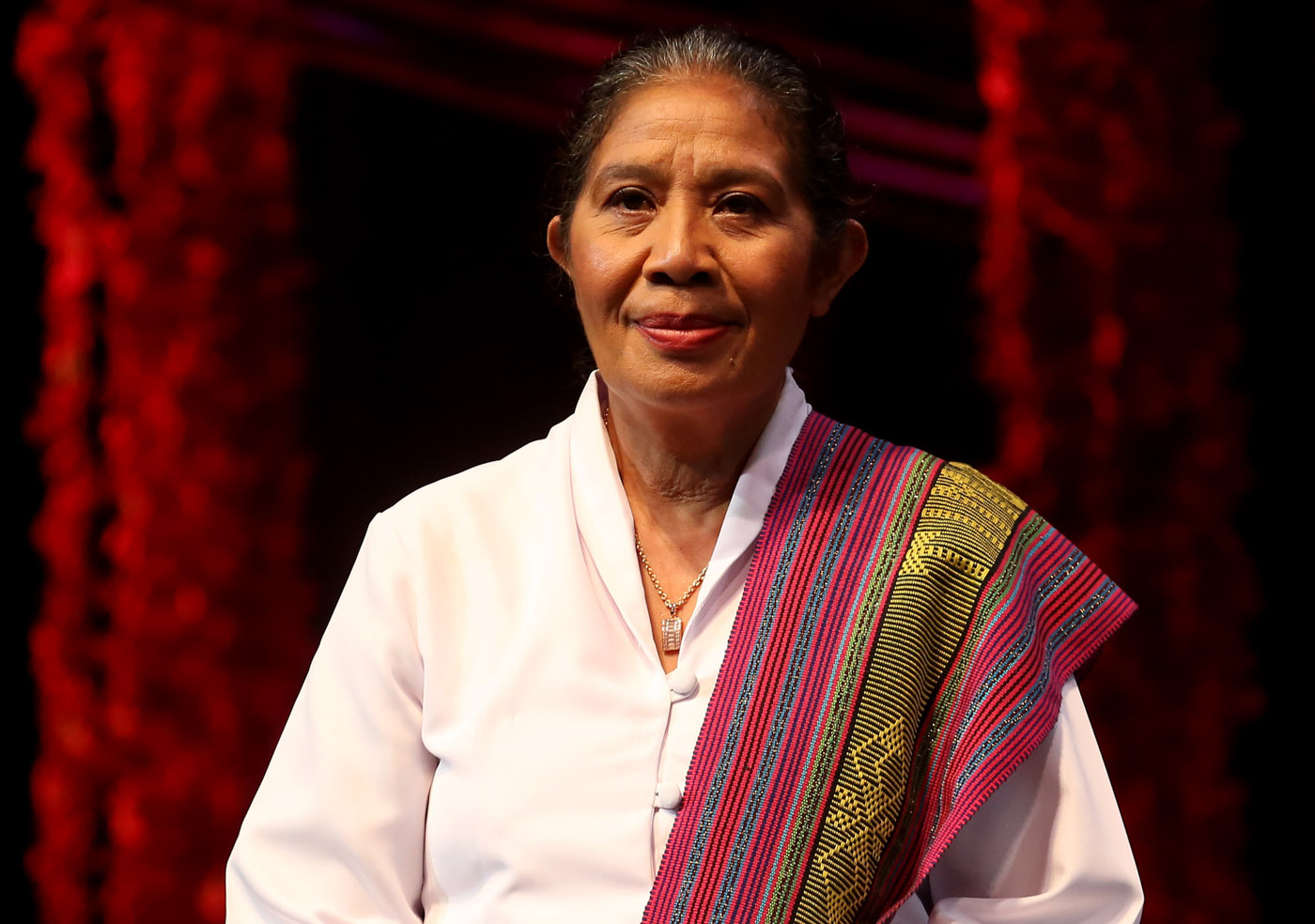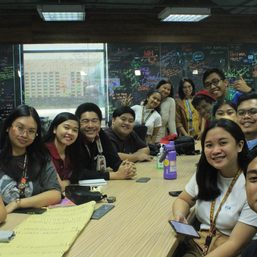SUMMARY
This is AI generated summarization, which may have errors. For context, always refer to the full article.
This compilation was migrated from our archives
Visit the archived version to read the full article.
MANILA, Philippines – “We have to always ask the question: What is the best thing I can offer for the country as a citizen?”
These are words of a woman who has lived her life always thinking about how else she can serve her countrymen.
2018 Ramon Magsaysay awardee Maria de Lourdes Martins Cruz – or Mana Lou, as most people fondly call her – considers it a blessing to have lived with her well-to-do family at a time when East Timor was anything but free.
Her education is a blessing too. In the 1980s, when East Timor was still under Indonesian rule, Mana Lou studied catechetic philosophy and was exposed to liberation theology at a Jesuit institute in Yogyakarta, Indonesia.
She eventually joined the Canossian Sisters congregation, only to leave before taking her final vows. She later established her organization, the Instituto Seculare Maun Alin Iha Kristu (ISMAIK) or Secular Institute of Brothers and Sisters in Christ, in 1989.
Mana Lou said she established ISMAIK because she wanted to “integrate faith [with] the work,” and she was looking for “brotherhood and sisterhood” during the Indonesian rule.
The kind of brotherhood and sisterhood that Mana Lou had in mind is not one that takes sides, and she was the first to exemplify this during East Timor’s tumultuous transition to independence. Back then, she reached out not just to those affected by the fighting between pro-Indonesia and pro-independence militias, but even to Indonesian soldiers and the warring militias themselves.
Social justice
But East Timor’s independence in 2002 turned out to be just the beginning of more challenges for the Southeast Asian country, which to this day remains one of the least developed countries in the world, according to the United Nations.
“Before I leave this world, I want to leave my legacy, [to] at least give something for the country, for the nation, especially for the poor people”
– Maria de Lourdes Martins Cruz, 2018 Ramon Magsaysay awardee
“Before the independence, we were excellent and organized, we were working together, we listened to one another, we had very good communication, because we were working for social justice for our country,” Mana Lou told Rappler in an interview in August.*
“But after the independence…because everybody’s thinking about getting a position in the government, and many things [have] happened, so that’s already starting to divide us.”
At least in her organization, Mana Lou is striving to bring people to work together: ISMAIK members, volunteers, and the communities where their 9 branch houses (called “schools of life”) are located.
In these “schools of life,” the organization encourages community participation and provides not just moral and spiritual formation, but also livelihood and skills training. Aside from ISMAIK, Mana Lou also established Bairo-Ata Clinic, a free clinic for the poor in East Timor.
Social justice and family
Mana Lou received the 2018 Ramon Magsaysay Award – the Asian equivalent of the Nobel Peace Prize – for her “pure humanitarianism in uplifting Timor Leste’s poor, her courageous pursuit of social justice and peace, and her nurturing the development of autonomous, self-reliant, caring citizens, so vital in new, post-conflict nations in the world.”
For Mana Lou, social justice begins with the family.
“For me, understanding social justice is basically from the family, in the way the family educate the children, in the way they can share something in the family,” she told Rappler.
She added: “If you know how to share everything in the family, then you become a good leader in your family, and you become a good leader for the nation. If your family don’t know how to share anything, you become selfish. I’m really worried about that. If you become a good leader, you know how to share, not to be greedy for yourself. That’s social justice.”
It’s been decades since Mana Lou dedicated her life to work for and with the poor. When asked what for her is the best way to empower the poor, she said one has to first understand who the poor are.
For Mana Lou, the poor in East Timor “doesn’t mean they’re homeless, or they don’t have anything. They have a lot of things, but they don’t know what to do with them because of lack of education.”
“That’s why my work is to help people, how to educate them, how to help them understand, how to cultivate, because they are rich, they are rich with the land, they can produce a lot, but they don’t know how to do it, they don’t know how to motivate, how to be innovative with their own land,” she said.
Hope for next generation
Still, Mana Lou’s work has been anything but easy, and has even raised eyebrows among those who do not understand why she has made it her life’s mission to help the poor.
“Some people [who] work in the government, they think ‘Why do you have to do this social justice? Why do you have to help the poor people? You’re not supposed to do, it belongs to the government, that’s the government’s problem. Why do you have to do that?”
Her answer? “I have to do this. It’s part of my mission, part of my charisma, part of my spiritual life to help poor people.”
But she admitted it’s difficult when the government “neglects” this kind of work.
“We’re hopeful [that] in the future, the government will open their eyes, their heart to thinking more [about] social justice and also help tackle social problems,” she said.
Until then, Mana Lou is banking on a new generation of Timorese to preserve not only their independence, but also the nation’s own values, identity, and culture.
“Nowadays, we’re starting to lose many things in the country, in the society, and this institution is trying to bring back what’s real of Timorese people,” she said, admitting that she is worried about how to pass the vision on to a new generation.
“We don’t want to lose them, but we want to pass the heritage of our greatness, our richness, our culture on to the new generation by doing the action as my institution works in East Timor at the moment, so that’s a big challenge for us.”
All things considered, Mana Lou still believes these learning experiences teach her patience and build her hope.
“I have courage to do this. Before I leave this world, I want to leave my legacy, [to] at least give something to the country, to the nation, especially to the poor people,” she added.

“If you know how to share everything
in the family, then you become a
good leader in your family, and you
become a good leader for the nation.”
Fight continues
In her speech during the Ramon Magsaysay Foundation’s presentation ceremonies last August 31, Mana Lou urged everyone to listen to the voices of the poor in times of difficulty and conflict.
Grateful for the recognition, she hopes the Ramon Magsaysay Award will help open the eyes of her country’s government to see the real situation in East Timor.
“With this award, for me, it gives me more empowerment for myself, not only [for] myself, but to fight for our struggle, to establish my foundation, and to continue my clinic,” she told Rappler.
In Mana Lou’s mind, there is still plenty to do. For instance, while her work in the past mostly focused on rural areas, she believes it’s time to “come back and tackle the problems in the city.”
“I know a lot of people [consider] myself as a mother for them, as a father for them, as a sister for them, as a grandma, as an auntie, as everything for them, and that’s why I was thinking about how to bring [the new] generation hope,” she explained.
This is why she wants to establish another foundation called the Samaritan Foundation that will empower people to work together and tackle the issues in the city. Her hope is that other organizations will give them a hand, including the government and the church.
Her country has been free for years now, but Mana Lou’s fight continues.
“This is the struggle for us: not only what the country can do for us, but what we can do for the country. So this is the challenge for us, this is our new fight.” – Rappler.com
*Mana Lou was accompanied by an interpreter, who translated her answers into English.
TOP PHOTO: Maria de Lourdes Martins Cruz is one of the 2018 Ramon Magsaysay awardees. Photo by Angie de Silva/Rappler
SECOND PHOTO: Maria de Lourdes Martins Cruz during the awarding ceremony held at the CCP in Pasay City on August 31, 2018. Photo by Inoue Jaena/Rappler
Read other 2018 Ramon Magsaysay profiles:
- ‘To forget is a crime’: Genocide survivor helps heal Cambodia’s wounds
- Vo Thi Hoang Yen: Opening doors for Vietnam’s PWDs
- Sonam Wangchuk challenges India’s ‘ritual’ education with common sense
Add a comment
How does this make you feel?
![[Time Trowel] Mentorship matters](https://www.rappler.com/tachyon/2024/04/mentorship-matters.jpg?resize=257%2C257&crop_strategy=attention)
![[OPINION] Education for life: Weaving ethics in all subject areas](https://www.rappler.com/tachyon/2024/03/Education-for-Life-Weaving-Ethics-in-All-Subject-Domains.jpg?resize=257%2C257&crop_strategy=attention)
![[OPINION] Limited intake of international students: Is Canada knee-capping its future?](https://www.rappler.com/tachyon/2024/02/tl-canada-forgeign-student-cap-02232024-2.jpg?resize=257%2C257&crop_strategy=attention)

![[Rappler Investigates] Who’s fooling who?](https://www.rappler.com/tachyon/2024/02/rodrigo-sara-duterte-2019.jpeg?resize=257%2C257&crop=167px%2C0px%2C900px%2C900px)
There are no comments yet. Add your comment to start the conversation.